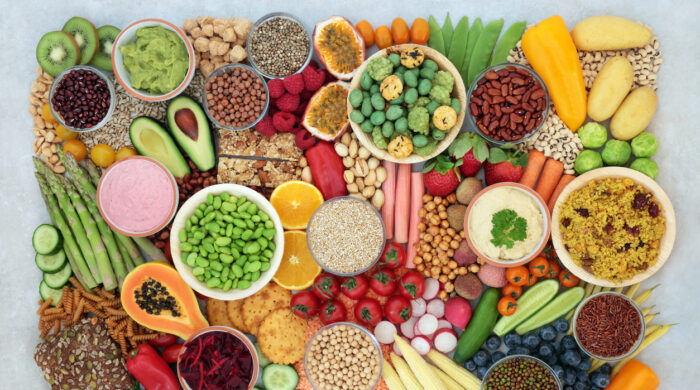Plant-based eating has grown in popularity over the past few years, and there is a range of plant-based resources available online — from TikTok videos and documentaries to food delivery services and restaurants. But what’s all the buzz about?
Eating a primarily plant-based diet has been shown to provide numerous health benefits, including improved heart health, lower risk of chronic diseases such as diabetes and cancer, and even weight loss.
Many plant-based eaters attribute their lifestyle to a concern for their long-term health and the environment. But what exactly is a plant-based diet and how can you determine if it is the right option for you?
Whether you’re interested in pursuing a plant-based diet yourself or just curious to learn more about it, let’s take a comprehensive dive into what a plant-based lifestyle means.
Is Plant-Based the Same as Vegan?
A plant-based diet consists of food primarily made of plants: vegetables, fruits, whole grains, nuts, seeds and legumes. While it does mean not eating processed food or animal products, it does not always mean vegan.
Different Approaches to Plant-Based Eating
There are a variety of approaches to plant-based eating and while each varies slightly, all are healthy options to consider:
- Vegetarian: A vegetarian plant-based eater eliminates meat, poultry, or fish but may consume dairy products and eggs.
- Vegan: Vegan means no animal products whatsoever, including meat, poultry, fish, dairy, eggs, and honey.
- Flexitarian: Flexitarian follows a mostly plant-based diet but allows for some animal products in moderation.
- Pescatarian: This type of plant-based eating includes fish and other seafood — but not meat or poultry.
What are the pros and cons of a plant-based diet?
The Pros of a Plant-Based Diet
Plant-based eating has a variety of pros to consider:
Better Heart Health. Studies have shown that plant-based diets can have a positive impact on heart health, potentially reducing the risk of heart disease.
Reduced risk of Chronic Disease. Plant-based eating has also been linked to a reduced risk of numerous chronic diseases, including diabetes and cancer.
Rich in Nutrients, Low in Fat. A plant-based diet is typically rich in nutrients such as fiber, vitamins and minerals. It is also low in saturated fat, which can help lower the risk of chronic diseases and improve overall health.
Weight Loss. Many people who switch to a plant-based diet find that they are able to lose weight and maintain a healthy weight more easily. Plant-based diets are often lower in calories and are regarded as a heart-healthy way to eat.
Environmentally Friendly. Plant-based diets are often considered to be better for the environment as well because the production of plant-based foods typically requires fewer resources and generates fewer greenhouse gas emissions than the production of animal-based foods.
The Cons of a plant-based diet
When examining the cons of a plant-based eating, there are two logistical considerations:
The Need for Supplements. Supplements are often recommended and needed to compensate for nutritional deficiencies in a plant-based diet. It is possible to meet your nutritional needs by supplementing for nutrients found primarily in animal-based foods such as vitamin B12 and omega-3 fatty acids.
Limits Your Food Choices. Plant-based diets might seem limited in terms of the types of foods available and may require more creative meal planning to ensure that all nutrient needs are met. However, with some research and experimentation, it is possible to find delicious and satisfying plant-based meals that meet your nutritional needs.
How to transition to a plant-based diet
Making the switch to a plant-based diet can seem daunting, but with a little planning and preparation, it can be a smooth and enjoyable transition. Here are some tips to help you make the switch:
- Start small: Try incorporating more plant-based meals into your diet, such as replacing meat with other protein sources like beans, lentils, and tofu, or plant-based meat alternatives.
- Plan ahead: Make sure to have plenty of plant-based options on hand, such as fruits, vegetables, whole grains, and plant-based proteins. Meal planning and prepping food in advance can help make sure you always have options.
- Find easy options: Try incorporating simple, plant-based meals such as soups, salads, smoothies into your diet and experiment with new recipes and ingredients to find options that you love.
- Ask a primary care provider for tips: Your primary care provider can provide you with personalized advice and guidance, as well as any necessary supplements or dietary modifications to ensure that you’re meeting all of your nutrient needs.
Recommended Resources
Consulting with your primary care provider is always an excellent option before making a major lifestyle change such as switching to a plant-based diet.
Additional resources recommended by our WWMG Cardiologists include:
- How Not to Die, a book about nutrition by Michael Greger, MD
- The Game Changers, a documentary that highlights the benefits of a plant-based diet, particularly for athletes and individuals who engage in physical activity.
WWMG Cardiologist Michael Duong, MD, recommends The Game Changers because it debunks common misconceptions about plant-based eating. “Overall, it dispels the myth that vegetarians and vegans only look like thin and skinny long-distance runners,” he said. “Plant-based diets have been adopted by athletes competing at the highest levels. These include professional boxers, MMA fighters, powerlifters, and professional football players.”
Interested in switching to a plant-based diet and have more questions? Request an appointment with a WWMG primary care provider. We look forward to supporting you in lifelong health.
